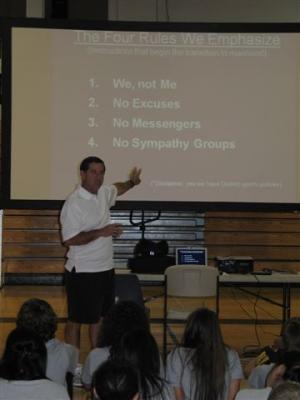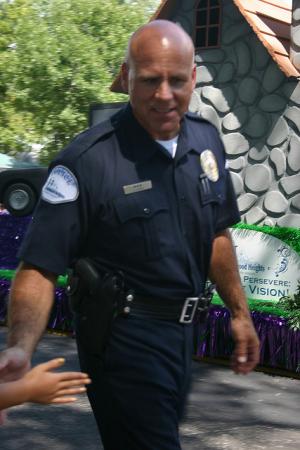Main Menu
Latest Blog Entry
User login
Team building: a different approach
“Pretty much everything we do in life is a co-operative endeavour”
 said Clay Erro at the beginning of his inspirational talk at GAIN. Clay is a recently retired Californian High School teacher and football coach.
said Clay Erro at the beginning of his inspirational talk at GAIN. Clay is a recently retired Californian High School teacher and football coach.
He was kind enough to share some of the lessons he has learnt over his career.
The main thrust of the lecture was in creating a culture and philosophy that gets young people excited. This is done by developing and nurturing relationships.
“We’re in the people business.”
What is your coaching philsophy?
Whatever your philosophy is:
- Believe in it.
- Sell it.
- Teach it.
- Adjust.
We are naive if we assume that an autocratic approach will create a lasting legacy. That is coaching through compliance. Clay is all about coaching with compassion (1).
This manifests itself into a different kind of philosophy:
- Question common practices and traditional beliefs.
- Emphasise the mental approach, as opposed to the physical.
- Emphasise relationships more than rules.
- Put philosophy into action daily.
- Focus on the process, rather than the outcome.
“The difference between good and GREAT is consistency.”
Mind is the key, not the body
We have all been there with our spreadsheets of super duper sets and latest periodised training plans. But, without the mind, the body will stay behind. The mind has more potential, is the most powerful and leads the body.
“What’s the quickest way to get better? Get smarter!”
Clay has a few coaching behaviours that are unique to him. He gets everyone’s attention by getting them to clap in time: “give me one, give me two, give me three, give me none.” He starts sentences and expects the group to finish them: “Rules are made to be …..”
These are designed to get the players actively involved in learning and speed up their response times.
“It is more important to understand your subjects, than to be an expert in your subject.”
Rules or Relationships?
 Belief in the team comes from the strength of relationships, more so than the rigidity of rules.
Belief in the team comes from the strength of relationships, more so than the rigidity of rules.
“Relationships are like a savings account, you deposit daily and then you can draw upon them in critical times.”
A lot of teams have rules, but Clay talked about the “paradox of rules”:
- They are made to be broken.
- Limit the coaches power and flexibility.
- Usually punish the team more than the individual.
- Turns the coach into a policeman.
- There is always an exception to the rule.
- They elicit excuses.
- Create a false sense of security.
Relationships on the other hand are the glue that hold the team together (2).
We, not me
The three most important words in any successful relationship are “We, not me.” (Paraphrasing Muhammed Ali’s famous “Me, We” poem?)
The basis of team building is inclusion, the basis of competition is exclusion. If you think of the best teams that you have been involved in, the people work together and feel part of the process. Think of the worst teams you have been involved in and it is like a sack full of cats trying to get on top.
One way of building inclusion is to get the players to teach other (Show, Do, Teach as Ed Thomas said last year). This helps build relationships and improve performance because:
- It builds respect and self-esteem in all members.
- The quickest way to learn something is to teach it.
- Rate of improvement increases rapidly.
- Everyone is a valued member.
- Builds bonds amongst all players and between all players and the coaches (3).
- Focuses the teaching on shared terminology and coaching points.
Summary
Clay is a shining example of a coach/ teacher with integrity who is making a real difference in young people’s lives.
He shakes everyones hand at the end of each session, he gets everyone to praise another team mate. Simple things that make his pupils feel welcome and worthwhile.
Clay was present throughout the week, and it was great to be able to chat and bounce ideas off him.
A wealth of experience in the trenches, humble, but gritty too.
A welcome antidote to today’s “get rich quick” pseudo gurus.
(Disclaimer: I had severe jet lag and kept nodding off, so any errors are mine alone.)
Further reading
Clay did things from his perspective and experience, but there is also some interesting research around this subject.
- Smith, M., Boyatzis, R.E. & Van Oosten, E. (2012). Coach with Compassion. Leadership Excellence, 29:3, 10.
- Boyatzis, R.E. (2012). Neuroscience research shows how resonant relationships are key to inspirational leadership. Ivey Business Journal,
- Van Oosten, E. (2006). Intentional Change Theory at the Organizational Level: A Case Study. Journal of Management Development. 25(7), 707-717.
Client Testimonials
 Jenny McGeever
Jenny McGeever
James has been my strength and conditioning coach since June 2009 and during this time he has provided me with constant support and helped me develop as an athlete, from Under 17 international level to senior international. He is currently helping me with my transition from fencer to Modern Pentathlete.
More


Comments
[…] about the qualities coaches should possess the highest two responses were that coaches should be approachable and have good communication […]
[…] Gary Winckler, Frans Bosch, Andy Stone, Steve Magness, Dave Ellis, Bill Knowles, Finn Gunderson, Clay Erro, Steve Myrland and Joe Przytula for helping me develop my knowledge and […]